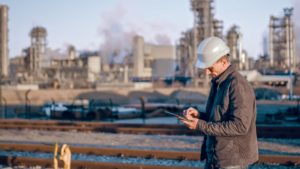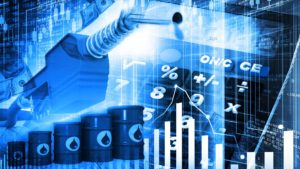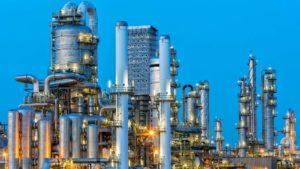The Use of Augmented Reality in the Oil and Gas Industry
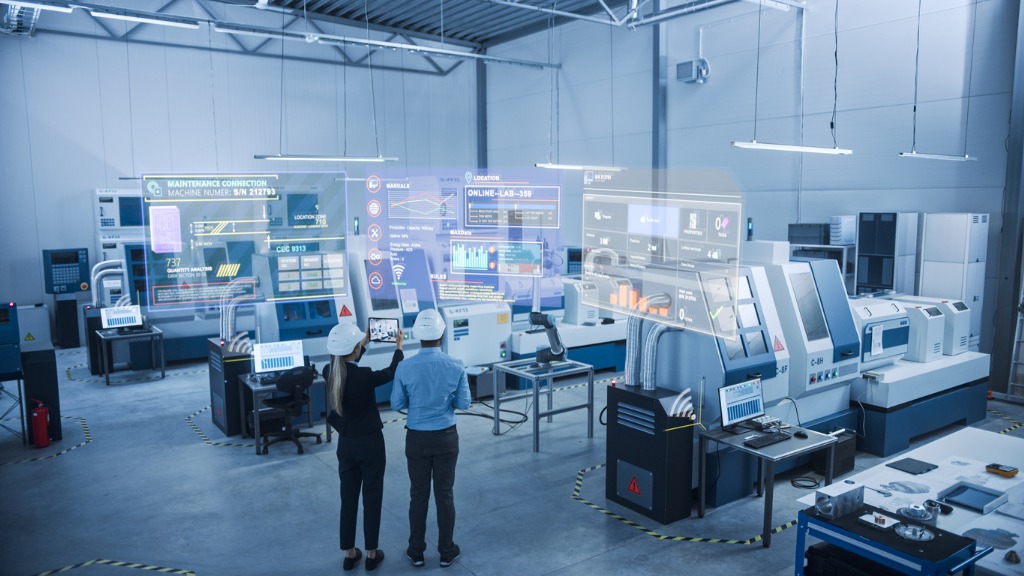
The oil and gas industry is known for being steeped in tradition and slow to implement new technologies, but the threat of alternative energy sources and the potential benefits promised by technological innovations have been pushing companies in this sector to transform their approach.
McKinsey research suggests that offshore oil and gas companies could reduce costs by up to 25 percent per barrel by deploying digital solutions, and augmented reality (AR) is one of those strategies.
The implementation of AR in the oil and gas sector has shown significant potential in recent years. Here are some of the challenges faced in this sector and how AR can address them to create more efficient, safer, and cost-effective operations.
Challenges Faced by the Oil and Gas Industry
Even with alternative energy sources, the demand for oil and gas is expected to grow for many years to come, but the oil and gas industry faces a number of challenges, including the following.
Improving Performance
To sustain the supply of gas or crude oil, companies are looking for ways to achieve more efficient operations and extend the life of existing assets.
Reduce Costs
Producing crude oil and refined products at lower costs will help companies remain competitive. Some of these gains can be achieved through optimized production systems.
Meeting Standards
Oil and gas companies are subject to a variety of environmental and safety regulations that impact their operational licenses and brand reputations. Companies increasingly must address these issues to stay in operation and remain competitive.
What Are AR and VR?
The terms augmented reality (AR) and virtual reality (VR) are sometimes used interchangeably. There are indeed some similarities. While both technologies allow the user to see things that aren’t physically present, some notable differences exist.
AR combines the physical world with digital elements, typically using a tablet or headset. For example, a user can employ AR in a retail store to navigate the aisles or use it to figure out how a piece of furniture might look in their existing room.
VR, on the other hand, completely immerses the user in the digital world by shutting out the physical one. By putting on a VR headset, the user is transported into space, under the sea’s surface, or into the cockpit of a fighter jet, enabling them to move around in a three-dimensional “world” and take various actions.
How Augmented Reality Helps the Oil and Gas Sector
The potential for augmented reality, and sometimes virtual reality, in the oil and gas sector, is almost limitless. Combined with other technologies like artificial intelligence and the Internet of Things (IoT), AR and VR are helping to drive digital transformation in this industry. Some of the most common use cases for AR and VR in the oil and gas sector include the following.
Remote Maintenance and Repairs
According to GE, an offshore oil and gas company could incur losses as high as $49 million from unplanned downtime. For a non-streamlined company, those losses can quickly double.
Knowing this, it’s critical to seamlessly perform and operate the drilling and completion activities without interruption.
AR-based applications can monitor equipment in real-time to report deviations in key metrics like temperature, magnetic field, etc. The application can give alerts when regular maintenance is due as well as when sensor readings fall outside set parameters.
When maintenance or repair is necessary, a technician can wear an AR headset that combines reality with digital information to guide the process. The “guide” can help a technician make a repair quickly and get the asset back online.
More Effective Workflow
Similar to how AR can help workers make an asset repair, it can also help them do their work more efficiently. AR overlays, such as smart glass hardware, in the oil and gas industry can help improve a worker’s effectiveness by providing visual indicators and clues, operation instructions for machinery, and process steps.
With a head tilt or nod, the worker can acknowledge instructions or maintain a digital “checklist” of completed tasks for their job, increasing overall efficiency.
Offsite and Enhanced Training
AR-enabled applications can be used to familiarize and train personnel with a company’s standard procedures, which is a more engaging substitute to manuals and handbooks. These applications are helpful for onboarding as well as ongoing training for field personnel. Employees need only use an AR-ready or VR training simulation to quickly get up to speed with new safety requirements or updated machinery or processes.
Improved Safety
There are a lot of risks on an oil platform or in a refinery environment. By using a combination of AR/VR training and various wearables, those risks can be drastically reduced.
With proper training, workers understand how to respond when something goes wrong. At the same time, workers can be outfitted with wearable devices that track things like GPS, heart rate, body temperature, etc. If a worker is in a dangerous situation, the employer can respond quickly and appropriately.
Better Rescue Operations
No one likes to think about accidents in the oil and gas industry, but they happen thanks to the hazardous environment and proximity to heavy equipment and dangerous materials. Rescue teams can now leverage AR and VR technology to simulate real-world scenarios that they might have to face. When an incident does happen, rescue teams can call up the same technology to improve response time and the safety of the team.
More Efficient Logistics
End-to-end logistics is always a challenge for complex industries like oil and gas. The enhanced connectivity that AR solutions can provide will drastically improve materials tracking and reduce the total costs of production. Using digital solutions for logistics management can also reduce the cost of vehicle service, staffing, materials, and emissions, leading to better overall results.
Become a Member of COPAS
While still in its earliest form, particularly in an industry that tends to be more conservative on the innovation front, the AR revolution is well underway in the oil and gas sector. As more companies explore use cases for AR and VR and move beyond pilot applications, they will continue to realize the benefits of these applications through greater efficiency, improved safety, and lower costs.
COPAS is the Council of Petroleum Accountants Societies. Members of COPAS are on the cutting-edge of the changes and innovations that represent accounting in the petroleum industry. In 1996, our organization created its Accredited Petroleum Accountant® (APA®) program to certify accountants within the oil and gas industry.
By joining COPAS, petroleum accountants receive more visibility in the industry, increased insight and knowledge, and a platform to collaborate with like-minded professionals. Contact us to learn more about becoming a member of COPAS.
COPAS POLICIES: Complaints | Cancellation & Refund Policy













